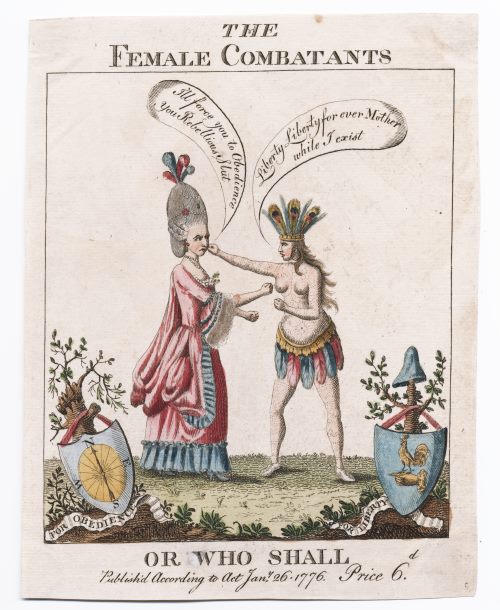Female Foes: Conflict Dispute and Identity in the Early Modern British Atlantic

Female Foes explores how female antagonism and conflict shaped early Atlantic culture
This project investigates how an emerging culture of civility and politeness in the early modern British Atlantic enhanced discussions about enmity and hostility.
This work asks:
- Who is an enemy and how did they differ from friends?
- How did women become enemies?
- How was enmity between women experienced?
Researcher: Dr Naomi Pullin
Project description
Early modern society was characterised by conflict. There was conflict between states, localities, groups and families. People disagreed over politics, religion, the economy and social relations.
Recent work has focused on the dynamic and innovative ways early modern women formed friendships, how they created spaces and languages of interaction. However, there has been little study of the tensions that arose from these exchanges.
Female Foes examines female relationships in Britain and North America in the seventeenth and eighteenth centuries. It pioneers the history of enmity and negative female sociability. The project offers an important contribution to early modern gender, political and religious history by showing how female antagonism and conflict shaped early Atlantic culture.
The project enhances early modern gender history by:
- Examining the relationship between friendship and enmity
- Investigating how women's capacity to reassert friendship and re-establish honour compared to their male contemporaries
- Questioning how far religious affiliation shaped how women understood their disputes and assesses its role in creating the conditions for tension and hostility between women
- Exploring how social and ethnic tensions in Britain's overseas empire created new conditions for female antagonism to be expressed in these frontier environments

Publications
‘Dangerous company’: Failed friendship and the negotiation of exclusion in eighteenth-century polite society’, in Naomi Pullin and Kathryn Woods (eds), Negotiating Exclusion in Early Modern England, 1560-1800 (forthcoming, Routledge, 2021)
Naomi Pullin and Kathryn Woods (eds), Negotiating Exclusion in Early Modern England, 1560-1800 (forthcoming, Routledge, 2021)
Project events
20 September 2020: 'Negative Sociability in Early Modern Britain and the Atlantic' A one-day workshop at the University of Cambridge
September 2020: 'Emotions and Religion' A one-day workshop at the University of Cambridge
Project talks
29 January 2020: ‘Not made for perpetual contemplation’: the pleasures and pains of solitude in early modern Britain’, Early Modern Seminar, University of East Anglia
4 July 2019: ‘The Negative Sociability of Women in Early Modern Britain’, Sociability in Early Modern Britain, c. 1500-1700: Who? Where? When? Why?, University of Birmingham
28 June 2019: ‘Female Friends and Enemies in Early Modern Britain’, Civility and Incivility in Early Modern Britain, University of Oxford
17 May 2019: ‘Contrasting Passions: Friendship and Enmity’, ‘Passions in Practice’ Workshop, University of Warwick
8 February 2019: ‘Women’s Experiences of Conflict in Early Modern Britain’. Early Modern Women’s Roles and Identities 1500-1800, Early Modern and Eighteenth-Century Centre Workshop, University of Warwick
22 January 2019: ‘Female Negative Sociability in Britain, 1660–1775’. Graduate Seminar in History, Lincoln College, University of Oxford
18 January 2019: ‘Best Friends and Worst Enemies: Women’s Experiences of Conflict in Early Modern Britain’. Women’s History Seminar, Institute of Historical Research, University of London
3 July 2018: ‘‘Unfitt for Company’: Female Sociability and Anti-Sociability in the Early Modern British Atlantic’, Society for Renaissance Studies 8th Biennial Conference, University of Sheffield.
